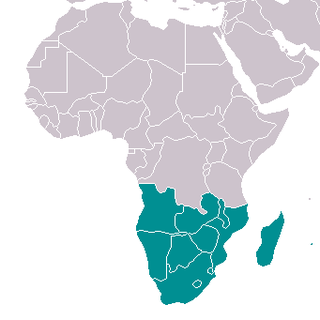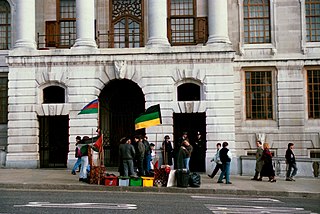
United Nations Security Council resolution 591, adopted unanimously on 28 November 1986, after recalling resolutions 418 (1977), 421 (1977), 473 (1980) and 558 (1984), the Council strengthened the mandatory arms embargo against apartheid South Africa imposed by Resolution 418, and made it more comprehensive. Resolution 591 sought to clarify vague terms from previous resolutions on the topic.

Foreign relations of South Africa during apartheid refers to the foreign relations of South Africa between 1948 and 1994. South Africa introduced apartheid in 1948, as a systematic extension of pre-existing racial discrimination laws. Initially the regime implemented an offensive foreign policy trying to consolidate South African hegemony over Southern Africa. These attempts had clearly failed by the late 1970s. As a result of its racism, occupation of Namibia and foreign interventionism in Angola, the country became increasingly isolated internationally.

United Nations Security Council Resolution 393, adopted on July 30, 1976, after a letter from a representative from Zambia, the Council condemned a recent attack by South Africa in Zambian territory, resulting in the destruction of property and loss of life. The resolution went on to express concern at South Africa's occupation and use of South West Africa as a base for attacking neighbouring African countries, and that the continuation of this would constitute a threat to international peace and security.

United Nations Security Council Resolution 424 was adopted unanimously on March 17, 1978; after hearing representations from Zambia, the Council expressed concern at unprovoked attacks against the country by the "illegal racist regime" in Southern Rhodesia, which resulted in deaths and destruction of property in Zambia. The Rhodesian Security Forces maintained that they had been attacking guerrilla bases in the country.

United Nations Security Council Resolution 428, adopted unanimously on May 6, 1978, after hearing representations from the People's Republic of Angola, Zambia and the South West Africa People's Organisation (SWAPO), the Council reminded Member States to refrain from using threats and use of force in their international relations. Reiterating Resolution 387 (1976), the present resolution condemned South Africa for its armed invasion of Angola via South West Africa (Namibia).

United Nations Security Council resolution 454 was adopted on 2 November 1979. After hearing representations from the People's Republic of Angola, the Council recalled resolutions 387 (1976) and 447 (1979), noting its concern and condemned the continuing attacks on the country by South Africa through illegally-occupied South West Africa.

United Nations Security Council resolution 473, adopted unanimously on 13 June 1980, after recalling resolutions 392 (1976), 417 (1977), 418 (1977), 454 (1979) and 466 (1980) and letters from the Committee for South Africa, the council expressed its concern and condemned South Africa for the killing of protesters, including schoolchildren, opposed to apartheid.

United Nations Security Council resolution 475, adopted on 27 June 1980, after hearing representations from the People's Republic of Angola, the Council recalled resolutions 387 (1976), 447 (1979) and 454 (1979), and expressed its concern and condemned the continuing attacks on the country by South Africa through occupied South West Africa.

United Nations Security Council resolution 527, adopted unanimously on 15 December 1982, having heard representations from Moshoeshoe II of Lesotho, the Council condemned, alongside a General Assembly resolution, an attack by South Africa on Lesotho, resulting in damage and the deaths of 40 people.

United Nations Security Council resolution 560, adopted unanimously on 12 March 1985, after recalling resolutions 473 (1980), 554 (1984) and 556 (1984), the council condemned the continuing repression of anti-apartheid activities in South Africa, noting that the repression would undermine the possibility of a peaceful solution.

United Nations Security Council resolution 566, adopted on 19 June 1985, after recalling resolutions 269 (1969), 276 (1970), 301 (1971), 385 (1976), 431 (1978), 432 (1978), 435 (1978), 439 (1978), 532 (1983) and 539 (1983), the Council expressed concern at the tension and instability caused the continued occupation of Namibia by South Africa, noting the apartheid policies implemented in the territory and that the territory was used as a springboard for attacks on other southern African countries.

United Nations Security Council resolution 567, adopted unanimously on 20 June 1985, after hearing representations from the People's Republic of Angola, the Council recalled resolutions including 387 (1976), 428 (1978), 447 (1979), 454 (1979), 475 (1980), 545 (1983) and 546 (1984), and expressed its concern at the continuing attacks on the country by South Africa through occupied South West Africa.

United Nations Security Council resolution 568, adopted on 26 July 1985, after expressing its outrage and concern at the suffering caused by the apartheid system in South Africa, the Council further condemned the repressive policies of the apartheid system including murders and forced removals, as well as the state of emergency imposed in 36 districts in the country, demanding it be lifted immediately.

United Nations Security Council resolution 571, adopted unanimously on 20 September 1985, after hearing representations from the People's Republic of Angola, the Council recalled resolutions including 387 (1976), 418 (1977), 428 (1978), 447 (1979), 454 (1979), 475 (1980), 545 (1983) and 546 (1984), and expressed its concern at the continuing attacks on the country by South Africa through occupied South West Africa.

United Nations Security Council resolution 572, adopted unanimously on 30 September 1985, after recalling Resolution 568 (1985) and noting a report from a mission to Botswana appointed by the Secretary-General, the Council endorsed the report regarding a South African attack on the country.

United Nations Security Council resolution 574, adopted unanimously on 7 October 1985, after hearing representations from the People's Republic of Angola, the Council recalled resolutions 387 (1976), 418 (1977), 428 (1978), 447 (1979), 454 (1979), 475 (1980), 545 (1983), 546 (1984), 567 (1985) and 571 (1985), and expressed its concern at the continuing attacks on the country by South Africa through occupied South West Africa.

United Nations Security Council resolution 577, adopted unanimously on 6 December 1985, after reaffirming Resolution 571 (1985), the Council endorsed a report by the Security Council Commission of Investigation, condemning the regime in South Africa for its continued and unprovoked attacks against the People's Republic of Angola through the occupied territory of South West Africa.

United Nations Security Council resolution 580, adopted unanimously on 30 December 1985, having heard representations from Lesotho and recalling Resolution 527 (1982), the Council condemned the recent attacks on the Kingdom of Lesotho by South Africa, resulting in loss of life and damage to property on 19 December, in which several South African refugees were murdered in Lesotho's capital Maseru by the South African Defence Force.

United Nations Security Council resolution 581, adopted on 13 February 1986, after hearing representations from Sudan and the front-line states and reaffirming resolutions 567 (1985), 568 (1985), 571 (1985), 572 (1985) and 580 (1985), the Council strongly condemned "racist South Africa" for its recent threats to perpetrate acts of aggression against neighbouring countries in southern Africa.
The Raid on Gaborone took place on 14 June 1985 when South African Defence Force troops, under the order of General Constand Viljoen, crossed into Botswana violating International Law and attacked South African émigrés living in exile in Gaborone. The raid, the fifth South African attack on a neighbouring country since 1981, killed 12 people including women and children; only five of the victims were actual members of the African National Congress (ANC), at the time the main opposition group against the National Party white supremacist minority regime.










